外研版英语七上 Module 4知识点
外研版英语七年级上册Starter Module 4 Unit2 知识点归纳

Unit2 知识点归纳【单词】1.h ot 热的①热的It’s very hot today.今天天气很热。
I want to have a hot bath.我想洗个热水操。
②烫的The water is hot. Please be careful.水是烫的。
请小心点儿。
③引申可表示“辣的”。
Pepper and mustard are hot.辣椒和芥末是辣的。
2. cool 凉快的①凉的,凉快的a cool day凉爽的一天 a cool room 一间凉爽的屋子Autumn is very cool in Beijing.北京的秋天很凉爽。
②冷静的;沉着的We need someone with a cool head.我们需要头脑冷静的人。
3. cold 冷的①冷的;寒冷的cold water 冷水 a cold wind 冷风It’s getting cold. Please close the window.天凉了。
请关上窗户吧。
②冷淡的,冷漠的,不热情的a cold handshake冷淡的握手【拓展】cold还可作名词,意为“寒冷”,还可表示“感冒”。
have a cold 患感冒Don’t go out in the cold without a coat.4. weather 天气备weather指某一地区某一时间的具体天气情况,如阴晴、气温、降水、风向等。
weather是不可数名词,其前不可加不定冠词a。
What is the weather like in Beijing?北京天气怎么样?5. like如同,像①如同Do it like this.照这样做。
②像She’s very like her mother.她很像她的母亲。
She cried like a baby.她像个婴儿一样哭。
【拓展】like还可作动词,意为“喜欢”,后可接名词、代词、动名词或动词不定式作宾语,表示“喜欢……”。
外研版七年级英语上册Module4 Healthy food 知识点
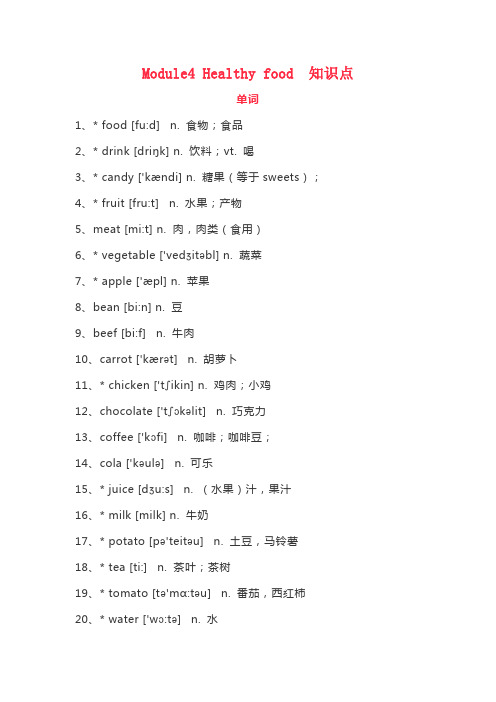
Module4 Healthy food 知识点单词1、* food [fu:d] n. 食物;食品2、* drink [driŋk] n. 饮料;vt. 喝3、* candy ['kændi] n. 糖果(等于sweets);4、* fruit [fru:t] n. 水果;产物5、meat [mi:t] n. 肉,肉类(食用)6、* vegetable ['vedʒitəbl] n. 蔬菜7、* apple ['æpl] n. 苹果8、bean [bi:n] n. 豆9、beef [bi:f] n. 牛肉10、carrot ['kærət] n. 胡萝卜11、* chicken ['tʃikin] n. 鸡肉;小鸡12、chocolate ['tʃɔkəlit] n. 巧克力13、coffee ['kɔfi] n. 咖啡;咖啡豆;14、cola ['kəulə] n. 可乐15、* juice [dʒu:s] n. (水果)汁,果汁16、* milk [milk] n. 牛奶17、* potato [pə'teitəu] n. 土豆,马铃薯18、* tea [ti:] n. 茶叶;茶树19、* tomato [tə'mɑ:təu] n. 番茄,西红柿20、* water ['wɔ:tə] n. 水21、* shop [ʃɔp] vi. 购物;买东西22、go shoping 去买东西,去购物23、* have [hæv, həv] aux. 助动词。
vt. 有,吃,喝24、* get [ɡet] vt. 得到;获得25、have got 有;拥有26、* some [sʌm] adj. 一些;若干;少量。
pron. 一些;某些27、* much [mʌtʃ] adj. 大量的,许多。
外研版英语七年级上册Module4 语法要点:some,any用法辨析
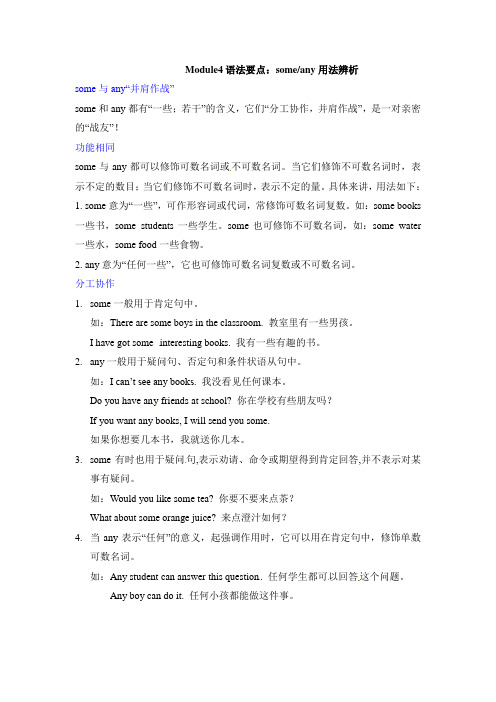
Module4语法要点:some/any用法辨析some与any“并肩作战”some和any都有“一些;若干”的含义,它们“分工协作,并肩作战”,是一对亲密的“战友”!功能相同some与any都可以修饰可数名词或不可数名词。
当它们修饰不可数名词时,表示不定的数目;当它们修饰不可数名词时,表示不定的量。
具体来讲,用法如下:1. some意为“一些”,可作形容词或代词,常修饰可数名词复数。
如:some books 一些书,some students一些学生。
some也可修饰不可数名词,如:some water 一些水,some food一些食物。
2. any意为“任何一些”,它也可修饰可数名词复数或不可数名词。
分工协作1.some一般用于肯定句中。
如:There are some boys in the classroom. 教室里有一些男孩。
I have got some interesting books. 我有一些有趣的书。
2.any一般用于疑问句、否定句和条件状语从句中。
如:I can’t see any books. 我没看见任何课本。
Do you have any friends at school? 你在学校有些朋友吗?If you want any books, I will send you some.如果你想要几本书,我就送你几本。
3.some有时也用于疑问句,表示劝请、命令或期望得到肯定回答,并不表示对某事有疑问。
如:Would you like some tea? 你要不要来点茶?What about some orange juice? 来点澄汁如何?4.当any表示“任何”的意义,起强调作用时,它可以用在肯定句中,修饰单数可数名词。
如:Any student can answer this question. 任何学生都可以回答这个问题。
Any boy can do it. 任何小孩都能做这件事。
外研版七年级上册英语Starter Module 4重要知识点讲解

Starter Module 4重要知识点讲解Unit 1一、询问星期几的句型-What day is it today?今天是星期几?-It's Monday.[点拨]what day用来对星期提问,回答用“It,s +星期”。
二、询问最喜欢哪天的表达What day is your favourite day?你最喜欢星期几?[点拨]"What day is your favourite day?H用于提问最喜欢哪天。
favourite此处用作形容词,意为“最喜欢的”,其后跟名词。
如:Sunday is my favorite day.我最喜欢的是星期天。
Unit 2一、询问天气状况的表达What's the weather like in spring?春天天气怎么样?[点拨]“What's the weather like..?'用于询问天气状况。
同义表达:How is the weather...?该问句的回答:It's +表天气状况的形容词(如cool, cold, warm, hot等)”。
-What's the weather like today?今天的天气怎么样?-It's cold.很冷。
Unit 3一、以Let开头的祈使句Let's play football after school.我们放学后去踢足球吧。
[点拨]例句是一个以let开头的祈使句,用于提出建议或征求别人的意见。
肯定:“Good idea./OK./All right./YesJet's...”等;否定:"Sorry,I...”二、介词on的用法[点拨]on是介词,意为“在......的时候”,主要是用在星期几,具体的某一天或某一天的早、中、晚或节日之前。
on Sunday在星期天on a cold morning在一个寒冷的早晨。
外研版英语七年级上册Starter Module 4 Unit3 知识点归纳

Unit3 知识点归纳【单词】1. football足球,为可数名词,其复数形式为footballs。
【构词】foot( n.脚)+ball( n.球)I like playing football.我喜欢踢足球。
There are two footballs under the bed.床底下有两个足球。
【辨析】soccer与footballsoccer指英式足球,而football则是美国人常指的橄榄球,也可称为American football。
但我们平时所说的足球通常用football。
注意美式足球与英式足球的不同。
如图"soccer football2. sport的复数形式sports,表示各项运动项目的总称。
My favourite sport is soccer.我最喜欢的运动是足球。
I think diving is an exciting sport.我认为跳水是一项刺激的运动。
【短语】do/play sports做运动sports shoes运动鞋a sports meeting 一场运动会【辨析】sport与game①sport多指户外的、有娱乐性的运动或锻炼,如:打球、跳高、游泳和钓鱼等。
是可数名词,有单复数形式。
Swimming is his favourite sport.游泳是他最喜欢的运动。
Sports help to keep people healthy.运动有助于人们保持身体健康。
②game主要指决定胜负的游戏,通常有一套规则,凡参加者均需遵守。
可以是体力方面的,也可以是脑力方面的,多用于美语中。
英式英语中则用match,这时game和match可以互换。
game的复数形式games,一般指大型的国际体育运动会、比赛会或学校的体育课、体育活动。
a baseball game/match 一场棒球赛the Olympic Games]the Olympics 奥林匹克运动会After a game on the sports field they became good friends.在运动场上进行一场比赛之后,他们变成了好朋友。
外研版七年级英语上册Module 4模块知识点归纳

外研版七年级英语上册Module 4 Healthy foodWe've got lots of apples.必背单词1.candy (n.)糖果→candies (pl.)2.potato (n.)马铃薯,土豆→potatoes3.have (v.aux.)助动词(v.)有,吃、喝→has(第三人称单数形式) 4.kind (n.)种类→kinds (pl.)5.bad (adj.)坏的,不好的→good(反义词)好的6.food (n.)食物,食品7.drink (n.)饮料;(v.)喝8.fruit (n.)水果9.meat (n.)肉10.vegetable (n.)蔬菜11.apple (n.)苹果12.bean (n.)豆13.beef (n.)牛肉14.carrot (n.)胡萝卜15.chicken (n.)鸡肉16.chocolate (n.)巧克力17.coffee (n.)咖啡18.juice (n.)果汁19.milk (n.)牛奶20.tea (n.)茶21.water (n.)水22.shop (v.)逛商店;购物23.get (v.)得到24.some (adj.)若干,一些,少量的(pron.)一些,某些25.so (conj.)因此,所以必背短语26.go shopping去买东西,去购物27.have got有;拥有28.too much太多29.lots of大量;许多必背句子30.Let's get some chicken.我们买些鸡肉吧。
31.What kind of fruit?哪种水果?32.How about some orange juice?买些橘汁怎么样?33.Let's get some for your mum.我们给你妈妈买一些。
Is your food and drink healthy? 必背单词1.healthy (adj.)健康的→health (n.)健康2.child (n.)(14岁以下的)小孩;儿童→children (pl.)3.right (adj.)正确的,对的→wrong(反义词)4.tooth (n.)牙齿→teeth(pl.)5.tired (adj.)劳累的(主语为人)→tiring (adj.)令人劳累的(主语为物) 6.important (adj.)重要的→importance (n.)重要性7.well(adv.)好地→good (adj.)好的8.fat (adj.)肥胖的→thin(反义词)瘦的9.delicious (adj.)美味的10.bread (n.)面包11.fish (n.)鱼肉;鱼12.hamburger (n.)汉堡包13.noodle (n.)面条14.rice (n.) 米;米饭15.sugar (n.)糖16.eat (v.)吃17.sweet (adj.)甜的18.egg (n.)蛋,鸡蛋19.eye (n.)眼睛20.cheese (n.)奶酪21.soup (n.)汤22.remember (v.)记住;想起23.stay (v.)保持,停留24.or (conj.)或者25.breakfast (n.)早饭lunch(n.)午饭26.every (adj.)每个,每一27.home (n.)家,家庭必背短语28.ice cream冰激凌29.be good for对……有帮助30.be bad for对……有害31.a bit稍微,有点儿32.get fat发胖必背句子33.Is your food and drink healthy?你的饮食健康吗?34.It is important to remember:eat well, stay healthy, and don't get fat!记住这些很重要:吃得好,保持健康,不要太胖!35.Have a good breakfast every morning.每天早上吃一顿很好的早饭。
外研版 七年级上册Starter Module 4 知识点总结

Starter Module 4 知识点一.单词季节season 春spring 夏summer 秋autumn\fall 冬winter天气weather 暖和的warm 炎热的hot 凉爽的cool 寒冷的cold一天day 今天today 明天tomorrow 最喜欢的favourite 喜欢like生日birthday 星期一Monday 星期二Tuesday 星期三Wednesday星期四Thursday 星期五Friday 星期六Saturday 星期天Sunday运动sport 篮球basketball 足球football 乒乓球table tennis 游泳swimming 让let 我们(宾格) us 参加,玩耍play 想法,主意idea 中国Chinese 北京Peking 英国England 伦敦London二.词组在黑板上on the blackboard 在你的书上in your book放学后after school 在春天in spring 在夏天in summer 在秋天in autumn 在冬天in winter 打篮球play basketball 踢足球play football 打乒乓球play table tennis去游泳go swimming 我最喜欢的运动my favourite sport你最喜欢的运动your favourite sport 他最喜欢的运动his favourite sport她最喜欢的运动her favourite sport 好主意good idea 在周一on Monday 在周日on Sunday 今天早上this morning 今天下午this afternoon三.句子1.今天是星期几?今天是周二。
What day is it today? It’s Tuesday.2.明天是星期几?明天是周三。
What day is it tomorrow? Tomorrow is Wednesday.3.今天是星期四,明天是星期五。
七年级英语上册 starter4个模块重点句型归纳总结 外研版

月考复习资料(Module1~~~Module4)I Greetings (基本问候语)1.Hello/ Hi 你好 2. Good morning/ afternoon/ evening 早上/下午/晚上好3.———How do you do?你好!(第一次见面时)———How do you do?你好!4.———How are you?(你好吗?)———I’m fine./ I’m OK/ I’m very well./ Just so—so(一般般). And you? ———I’m fine, too(也). Thank you.5.———Nice to meet you!(见到你很高兴!)———Nice to meet you,too!(见到你我也很高兴!)II 重点句型1.What’syourname, please? (请问你叫什么名字?)什么是你的名字请2.My name is ……/ I’m …(我的名字是。
/我是。
)我的名字是我是3.This is ……(这位是。
)这位/个是4.———What’s this in English?(这用英语怎么说/ 这是什么?)什么是这个用英语———It’s a book.(它是一本书)它是一本书5.———What are these?(这些是什么?)什么是这些———They are books./ These are books.(他们是书/ 这些是书)他们是书这些是书6.———How many desks are there?(有多少X桌子?)多少桌子有---------There areten desks.(有十X桌子)/ There is (only) one desk./(仅仅只有一X桌子)有十(X)桌子有仅仅一(X)桌子There is no desk. (没有桌子)有不桌子What colour is the tree?(这棵树是什么颜色的?)什么颜色是这(棵)树-------I t’s green.(它是绿色的)它是绿色------- What colour are the flowers?(这些花是什么颜色的?)什么颜色是这(些)花------- They’re blue.(他们是蓝色的)它们是蓝色8.------ How do you spell “blue”?(怎样拼写“blue”)怎样你拼写蓝色Where’s my/the coat?(我的/这件外套在哪儿?)哪儿是我的/这(件)外套------ It’s on the bed.(它在这X床上)它是在。
七年级上册Module4Healthyfood外研版七年级英语上册M

外研版新标准英语七年级上Module 4 Healthy foodUnit 1 We've gotlots of apples教学课型:Listening and Speaking教材分析本模块是外研版七年级上册第四模块,以“Healthy fbod”为话题,针对中学生挑食,吃零食的现象,重点介绍了健康食品。
本话题与学生的生活实际紧密相关,因而七年级学生对此很感兴趣,同时也增加了他们对健康食品的了解,有助于培养其健康的饮食习惯。
本节课是第一单元,侧重培养学生的听说能力,对话语境是托尼和爸爸谈论家里有什么食物及还需购买什么食物,自然引出语法项目“have/have got…”句型,要求学生能用“have/have got…”结构谈论购买什么食物,同时引入“健康食物”的概念。
学情分析本单元的主题是谈论水果、蔬菜和饮料方面的购物计划,围绕这一主题进行一系列的交际活动, 本课的学习主体是初一学生,他们好奇心强,乐于表达,有较强的模仿能力和求知欲,并具备了简单的英语口语交际的能力,他们对于蔬菜和水果单词的学习应该不成问题。
但是由于课堂时间有限,学生对have/has got句型的肯定句,否定句和疑问句的运用可能不够熟练,需要更多时间操练,因此本人在教学中设置了小组合作学习,针对不同层次学生的学习,安排可选择的难易活动和题目,以提高综合运用语言能力,使各个层次的学生都有所收获。
教学目标1 .知识与技能目标1)功能谈论健康食品2)词汇理解并掌握本单元中的下列单词(准确发音、拼写、掌握词性、理解词义、并能真实运用)。
名词(214、):food, drink, candy, fruit, meat, vegetable, apple, bean, beef, carrot, chicken, chocolate, coffee, cola, juice, milk, potato, tea, tomato, water, kind形容词(4 个):some, any, much, bad动词(4 个):drink, shop, have, has短语(6 个):go shopping fbr, too much. How about...? lots of, be good/bad fbr, all right3)语法掌握“have/hasgot…”句型的肯定句、否定句、一般疑问句及其回答;能在句子中正确使用“some” 和“any”;能区分可数名词和不可数名词4)语音正确朗读[s] [z] [t] [d]5)能听懂关于食物和饮料的对话;能通过语调识别出句式。
2020年外研版七年级英语上册 Module 4
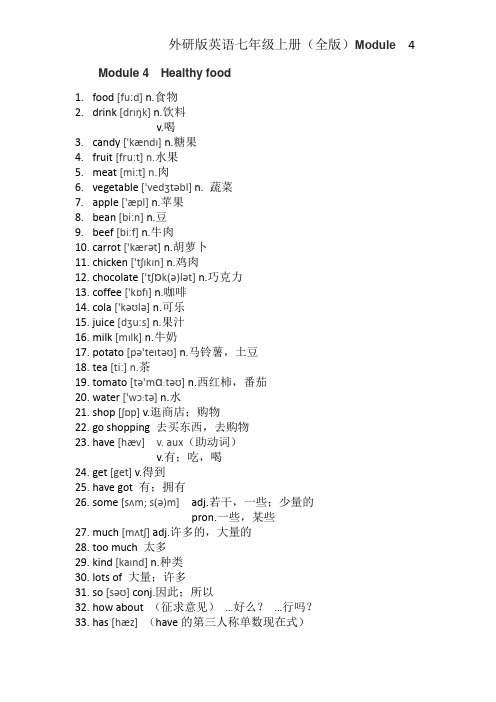
Module 4 Healthy food1.food [fu:d] n.食物2.drink [drɪŋk] n.饮料v.喝3.candy ['kændɪ] n.糖果4.fruit [fru:t] n.水果5.meat [mi:t] n.肉6.vegetable ['vedʒtəbl] n. 蔬菜7.apple ['æpl] n.苹果8.bean [bi:n] n.豆9.beef [bi:f] n.牛肉10.carrot ['kærət] n.胡萝卜11.chicken ['tʃɪkɪn] n.鸡肉12.chocolate ['tʃɒk(ə)lət] n.巧克力13.coffee ['kɒfɪ] n.咖啡14.cola ['kəʊlə] n.可乐15.juice [dʒu:s] n.果汁k [mɪlk] n.牛奶17.potato [pə'teɪtəʊ] n.马铃薯,土豆18.tea [ti:] n.茶19.tomato [tə'mɑːtəʊ] n.西红柿,番茄20.water ['wɔːtə] n.水21.shop [ʃɒp] v.逛商店;购物22.go shopping 去买东西,去购物23.have [hæv] v. aux(助动词)v.有;吃,喝24.get [get] v.得到25.have got 有;拥有26.some [sʌm; s(ə)m]adj.若干,一些;少量的pron.一些,某些27.much [mʌtʃ] adj.许多的,大量的28.too much 太多29.kind [kaɪnd] n.种类30.lots of 大量;许多31.so [səʊ] conj.因此;所以32.how about (征求意见)…好么?…行吗?33.has [hæz](have的第三人称单数现在式)34.bad [bæd] adj.坏的;不好的35.healthy ['helθɪ] adj.健康的36.delicious [dɪ'lɪʃəs] adj.美味的37.bread [bred] n.面包38.fish [fɪʃ] n.鱼肉;鱼39.hamburger ['hæm,bɜːgə] n.汉堡包40.ice cream [,aɪs'kri:m] n.冰激凌41.noodle ['nuːd(ə)l] n.面条42.rice [raɪs] n.米;米饭43.sugar ['ʃʊgə] n.糖44.eat[iːt]v.吃45.child(pl. children)[tʃaild];['tʃɪldrən] n.(14岁以下的)小孩,儿童46.be good for 对…有帮助47.sweet [swiːt] adj.甜的48.be bad for 对…有害的49.right [raɪt] adj.正确的,对的50.egg [eg] n.蛋,鸡蛋51.eye [aɪ] n.眼睛52.cheese [tʃi:z] n.奶酪53.tooth [tu:θ](pl. teeth[ti:θ])n.牙齿54.bit [bɪt] n.一点;少许55.a bit 稍微;有点儿56.tired [taɪəd] adj.劳累的57.soup [su:p] n.汤58.important [ɪm'pɔːt(ə)nt] adj.重要的59.remember [rɪ'membə] v.记住;记起60.well [wel] adv.好地61.stay [steɪ] v.保持;停留62.fat [fæt] adj.肥胖的63.get fat 发胖64.or [ɔː] conj.或者65.breakfast ['brekfəst] n.早饭66.lunch [lʌntʃ] n.午饭67.home [həʊm] n.家;家庭68.dinner ['dɪnə] n.晚饭;正餐69.banana [bə'nɑːnə] n.香蕉70.buy [baɪ] v.买。
外研版英语七年级上册 Module 4 知识点+习题
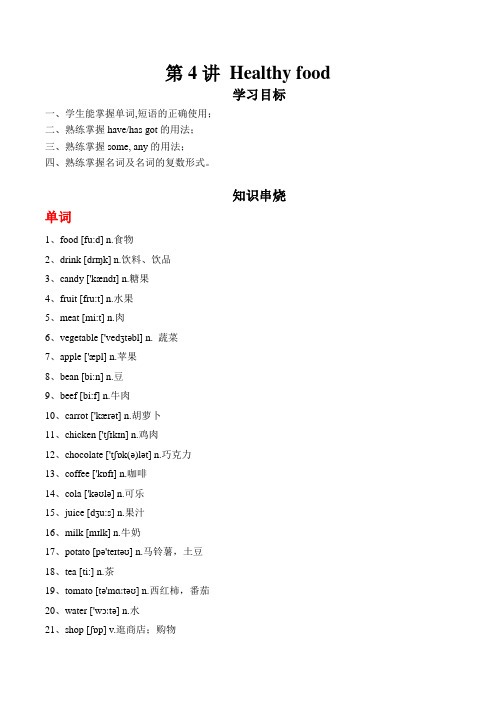
第4讲Healthy food学习目标一、学生能掌握单词,短语的正确使用;二、熟练掌握have/has got的用法;三、熟练掌握some, any的用法;四、熟练掌握名词及名词的复数形式。
知识串烧单词1、food [fu:d] n.食物2、drink [drɪŋk] n.饮料、饮品3、candy ['kændɪ] n.糖果4、fruit [fru:t] n.水果5、meat [mi:t] n.肉6、vegetable ['vedʒtəbl] n. 蔬菜7、apple ['æpl] n.苹果8、bean [bi:n] n.豆9、beef [bi:f] n.牛肉10、carrot ['kærət] n.胡萝卜11、chicken ['tʃɪkɪn] n.鸡肉12、chocolate ['tʃɒk(ə)lət] n.巧克力13、coffee ['kɒfɪ] n.咖啡14、cola ['kəʊlə] n.可乐15、juice [dʒu:s] n.果汁16、milk [mɪlk] n.牛奶17、potato [pə'teɪtəʊ] n.马铃薯,土豆18、tea [ti:] n.茶19、tomato [tə'mɑːtəʊ] n.西红柿,番茄20、water ['wɔːtə] n.水21、shop [ʃɒp] v.逛商店;购物22、go shopping 去买东西,去购物23、have [hæv] v. aux(助动词)有;吃,喝24、get [get] v.得到25、have got 有;拥有26、some [sʌm; s(ə)m] adj.若干,一些;少量的一些,某些27、much [mʌtʃ] adj.许多的,大量的28、too much 太多29、kind [kaɪnd] n.种类30、lots of 大量;许多31、so [səʊ] conj.因此;所以32、how about (征求意见)…好么?…行吗?33、has [hæz] (have的第三人称单数现在式)34、bad [bæd] adj.坏的;不好的35、healthy ['helθɪ] adj.健康的36、delicious [dɪ'lɪʃəs] adj.美味的37、bread [bred] n.面包38、fish [fɪʃ] n.鱼肉;鱼39、hamburger ['hæmbɜːgə] n.汉堡包40、ice cream [,aɪs'kri:m] n.冰激凌41、noodle ['nuːd(ə)l] n.面条42、rice [raɪs] n.米;米饭43、sugar ['ʃʊgə] n.糖44、children ['tʃɪldrən] n.(14岁以下的)小孩,儿童45、be good for 对…有帮助46、sweet [swiːt] adj.甜的47、be bad for 对…有害的48、right [raɪt] adj.正确的,对的49、egg [eg] n.蛋,鸡蛋50、eye [aɪ] n.眼睛51、cheese [tʃi:z] n.奶酪52、tooth [tu:θ](pl. teeth[ti:θ])n.牙齿53、bit [bɪt] n.一点;少许54、a bit 稍微;有点儿55、tired [taɪəd] adj.劳累的56、soup [su:p] n.汤57、important [ɪm'pɔːt(ə)nt] adj.重要的58、remember [rɪ'membə] v.记住;记起59、well [wel] adv.好地60、stay [steɪ] v.保持;停留61、fat [fæt] adj.肥胖的62、get fat 发胖63、or [ɔː] conj.或者64、breakfast ['brekfəst] n.早饭65、lunch [lʌntʃ] n.午饭66、home [həʊm] n.家;家庭67、dinner ['dɪnə] n.晚饭;正餐68、banana [bə'nɑːnə] n.香蕉69、buy [baɪ] v.买课文U1 We've got lots of apples.Tony’s dad: Tony, let's go shopping for food and drink. Now, we haven't got any meat. Let's get some chicken.Tony: OK. Have we got any chocolate?Tony’s dad: Yes, we have. Too much chocolate isn't good for you. Let's get some fruit.Tony: What kind of fruit? Apples?Tony’s dad: No, we've got lots of apples. We haven't got any oranges, so let's get some.Tony: OK. How about some orange juice?Tony’s dad: Yes, good idea! And coffee. Let's get some for your mum. She hasn't got any coffee. Tony: All right, some coffee for Mum, and some cola for me. I haven't got any cola.Tony’s dad: No cola! Cola is bad for you! How about some tea?Tony: Oh, too bad!U2 Is your food and drink healthy?Healthy food and drink for childrenIs your food and drink healthy? A lot of ice cream, hamburgers and cola is not healthy. Meat is healthy but too much meat is not good for children. Cola and candy are very sweet, and too much sugar is bad for you.Eat the right food and be healthy. Carrots, eggs and sweet potatoes are good for your eyes. Milk, cheese and fish are good for your teeth. A bit tired? Have lots of delicious chicken soup! It is important to remember: eat well, stay healthy, and don't get fat!·Eat noodles or rice, not hamburgers.·Have a good breakfast every morning.·Drink juice, water and milk, not cola.·Eat lots of fruit and vegetables.语法一、have/has got 的用法1. have got意为“有;拥有”,如果想表达某人拥有某物,可用句型“主语+have/has got+其他”,其中have有人称和数的变化,当句子主语为第三人称单数或单数名词时,用has got。
外研版英语七年级上册Module 4 Unit1 核心词汇讲解

Unit1 核心词汇讲解1.food / fuːd/ n. 食物,食品。
大多数情况下为不可数名词,但当表示特定种类的食物,即表示物品的种类时为可数名词,类似的词还有drink, fruit, fish等。
The food here is delicious. 这儿的食物很好吃。
【拓展】食物类词汇小结:dumpling 饺子rice 大米;米饭noodle 面条sandwich 三明治hamburger汉堡包pizza 比萨2.drink / drɪŋk/ n. 饮料。
作名词“饮料〞讲时,一般为不可数名词,但是表示“一杯或一份饮料、酒水时,为可数名词。
这是一个固定用法,一般在前面加a, 即 a drink。
Let’s go for a drink. 让我们去喝一杯吧。
【拓展】drink v. 喝固定搭配:drink to 为……干杯,为……祝福。
All raise your glasses and drink to Katie and Tom!大家举杯祝福凯缇和汤姆吧!3.candy / 'kændɪ/ n. 糖果。
【拓展】既可以作可数名词,又可作不可数名词。
表示“一块糖〞用a candy, 表示“一盒糖〞用a box of candy。
candies是其复数形式,表示各种各样的糖。
在英式英语中,多用sweet表示“糖果〞。
Candy isn’t healthy food. 糖果不是安康的食物。
4.meat / miːt/ n. 肉。
The tiger likes to eat meat. 老虎喜欢吃肉。
【拓展】meat 是不可数名词,指各种肉的总称,包括pork猪肉, beef牛肉, chicken 鸡肉等。
pork, beef和chicken都是不可数名词。
chicken还可意为“小鸡〞。
5.chicken / tʃɪkɪn/ n. 鸡肉。
【拓展】为不可数名词,作为食品的鸡肉一律用chicken表示,不管这种肉来自cock还是hen。
外研版英语七上Module 4重要单词语法点总结

七上Module 4 Healthy food1.food n.1.“食物,食品”,表示泛指的食物或食物总体时是不可数名词(在大多数情况下用)What's your favorite food? 你最喜欢的食物是什么?Let’s buy some . 我们去买些食物吧。
2.当表示特定的食品或某种类的食物时,为可数名词。
sea foods baby foods 婴儿食品frozen foods 冷冻食品 a favourite food最喜欢的食物There are all kinds of on the table. 桌子上有各种各样的食物。
2.drink n.1.意为“饮料”时,一般为名词。
Have you got any drink? 你有饮料吗?2.指不同种类的饮料时,为名词。
There are all kinds of drinks in the shop.Cola isn’t a healthy drink. 可乐不是一种健康的饮料。
3.还可指“一杯(饮料)”或“一份(饮料)”。
Let’s have a drink.Please give me a cold drink.【拓展】drink作动词,“”。
I don’t drink tea.You should drink more hot water.Would you like to drink some juice?1.I am thirsty, I need some .(drink)2.Mary often (drink) some milk for breakfast.3.candy n 糖果4.fruit n.1.“水果”,指水果总称时,为名词。
Do you like fruit? ( 泛指水果) 你喜欢水果吗?2.指水果的种类或个别水果时,是名词。
I like to eat apples, bananas and other fruits. ( 强调种类用fruits ) 我喜欢吃苹果、香蕉及其他水果。
外研版七年级上册Module 4 Healthy food知识点 及练习
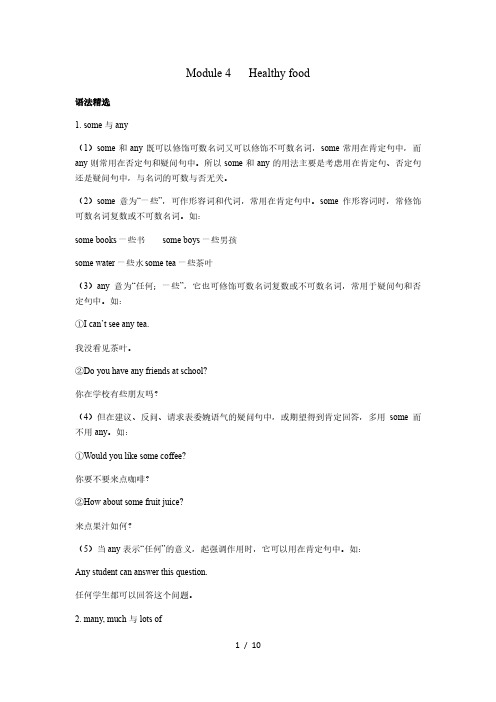
Module 4 Healthy food语法精选1. some与any(1)some和any既可以修饰可数名词又可以修饰不可数名词,some常用在肯定句中,而any则常用在否定句和疑问句中。
所以some和any的用法主要是考虑用在肯定句、否定句还是疑问句中,与名词的可数与否无关。
(2)some意为“一些”,可作形容词和代词,常用在肯定句中。
some作形容词时,常修饰可数名词复数或不可数名词。
如:some books一些书some boys一些男孩some water一些水some tea一些茶叶(3)any意为“任何;一些”,它也可修饰可数名词复数或不可数名词,常用于疑问句和否定句中。
如:①I can’t see any tea.我没看见茶叶。
②Do you have any friends at school?你在学校有些朋友吗?(4)但在建议、反问、请求表委婉语气的疑问句中,或期望得到肯定回答,多用some而不用any。
如:①Would you like some coffee?你要不要来点咖啡?②How about some fruit juice?来点果汁如何?(5)当any表示“任何”的意义,起强调作用时,它可以用在肯定句中。
如:Any student can answer this question.任何学生都可以回答这个问题。
2. many, much与lots of(1)many意为“许多”,用来修饰可数名词复数。
如:①Are there many students in his class?他的班上有很多学生吗?②I haven’t got many English books.我没有很多英语书。
(2)much意为“许多”,用来修饰不可数名词。
如:①We haven’t got much work to do.我们没有太多工作要做。
②Is there much milk in the bottle?瓶子里有很多牛奶吗?(3)lots of=a lot of,意为“许多”,它既可以修饰可数名词,相当于many;也可以修饰不可数名词,相当于much。
外研版七年级英语上册 素材 Module 4some与any

some与any的“一些”小事some和any都可表示“一些”的意思,但你知道它们的“一些”异同点吗?请看——一、相同用法some和any都可表示“一些”之意,其后都可接可数名词复数形式或者不可数名词。
如:I have some books, but I don’t have any computers.我有些书,但没有电脑。
There isn’t any water in the cup.杯子里没有水。
二、不同用法1. some表示“一些”之意,常用于肯定句中。
如:My brother has some good friends at school.在学校我弟弟有一些好朋友。
2. any表示“一些”之意,常用于否定句和疑问句中。
如:There aren’t any new classmates in our class.我们班没有新同学。
Is there any milk in the bottle? 瓶子里有牛奶吗?三、特殊用法1. some也可用于表示提出建议、邀请或请求等语意的疑问句中;希望对方作出肯定回答的一般疑问句中也常用some。
如:Would you like some oranges, please? 你想吃几个橘子吗?May I ask you some questions? 我可以问你一些问题吗?2. 在一些固定短语中,即使是疑问句,也要使用some。
如:Do you often do some shopping on Sundays? 你经常星期天去购物吗?3. any也可用于肯定句中,表示“任何的”之意。
如:If you have any questions, you can ask me.如果你有任何问题,可以问我。
You can come here at any time. 你可以任何时候来这儿。
外研版英语七年级上册Module 4 语法学习 (have got 和 名词)

鸡肉
orange 橘子
橘子汁
2) 抽象名词是指表示动作、状态、 品质、感情等抽象概念的词。
e.g. work (工作), homework (作业) love (爱), friendship (友谊)等。
3. fish fish可作可数名词,意思是“鱼”, 复数形式仍为fish。
e.g. My grandmother has got a / three fish. 我奶奶养了一条/ 三条鱼。
2) 以s, sh, ch, x等结尾加 –es e.g. bus- buses
watch- watches box- boxes brush- brushes
3) 以辅音字母+y结尾, 去y加 ies, e.g. baby---babies city-cities
library-libraries 元音字母+y 结尾的名词变复数时, 直接加s变复数。 e.g. monkey---monkeys
(1) There are lots of fish in this pond. __n_._鱼__________
(2) Betty’s brother can fish. _v_._钓__鱼_______
(3) I like eating rice with fish for lunch. _n_._鱼__肉________
男生 PK 女生: 在黑板上写下可数名词和不可数名词, the more, the better!(多多益善)
注意:有些名词既能用作可数名词,又能用作不可 数名词,但意义不同。
单词 可数
不可数
paper 报纸,试卷,文件 纸
glass 玻璃杯
玻璃
room 房间
- 1、下载文档前请自行甄别文档内容的完整性,平台不提供额外的编辑、内容补充、找答案等附加服务。
- 2、"仅部分预览"的文档,不可在线预览部分如存在完整性等问题,可反馈申请退款(可完整预览的文档不适用该条件!)。
- 3、如文档侵犯您的权益,请联系客服反馈,我们会尽快为您处理(人工客服工作时间:9:00-18:30)。
Module 4 Healthy food一、【课前寒暄】•上课前与学生进行交流,互相了解二、【课前热身】•引导学生用英文简单介绍自己最喜欢吃的食物和饮料三、【内容讲解】★课文重点知识梳理Unit 11.Healthy food.healthy是以health为词根派生出的形容词。
我们以名词health为词根, 可以派生出形容词healthy, 副词healthily, 也可以在形容词healthy之前加前缀-un, 构成反义词unhealthy,意为“不健康的”。
His grandfather is in good health.他祖父身体健康。
We have to eat and drink healthily.我们必须健康地饮食。
Is Coke an unhealthy drink?可乐是一种不健康的饮料吗?2.重点单词1.Food n. 食物,食品【通常为不可数名词,但是在指特定种类的食物时为可数名词,这类的词还有drink, fruit, juice】Ex. I like Chinese food very much. 中式食品Bread is a good food.2. Meat n. 肉[不可数名词] E.g. a dish of meat 一盘肉 a piece of meat 一片肉3. chicken n. A. 鸡肉,不可数 B. 小鸡,鸡,可数名词4. Chocolate n.巧克力【不可数】作:巧克力糖,夹心巧克力,则用复数形式 A box of chocolates5. milk n.[不可数] 牛奶【英语中表示液体的词一般是不可数的,比如tea, water】6. potato n. 马铃薯,土豆【其复数形式是potatoes】巧计以“o”结尾的名词复数-----串联法:黑人英雄爱吃土豆和西红柿。
3.Tony, let’s go shopping for food and drink.①Let’s ≈let us let sb. do sth. 让某人做某事Let’s go to play basketball on the playground.② go shopping 去购物go doing = go to dogo swimming = go to swim③ food “食物” drink “饮料” fruit “水果”均为不可数名词,可用some/ any来修饰4.Now, we haven’t got any meat.have got “有”,用于口语中,和have同义。
①表达某人拥有某物:主语+ have(has)got + 其它②主语是第三人称单数(he/she/it)及单数名词时,用has got变否定句:have/ has 后加not, 缩写为haven’t got/ hasn’t got变一般疑问句:把have/ has提到句首,肯定回答:Yes,主语+ have/ has.否定回答:No,主语+ haven’t/ hasn’t(1) He _____ got a cat.A. notB. isn’tC. hasn’tD. haven’t(2) --- Has Tony got any brothers with him in China.---_____.A. Yes, Tony hasB. Yes, he hasn’tC. No, he hasn’t5.Let’s get some chicken.get “去取(或带来),得到”I ____ a new pencil box.some与any的区别① some 一般用于肯定句中,any用于否定句和一般疑问句中。
②以can, could, would引导的疑问句,表示委婉客气的语气时,用some而不用any。
6. Too much chocolate isn’t good for yo u.A. too much + 不可数名词too many + 可数名词的复数Eating too much sugar is bad for your teeth. 吃太多的糖对你的牙齿有害。
The car is so expensive, I haven’t ___money.A. too manyB. too muchC. much tooD. many tooB. be good for 对…… 有好处be bad for 对…… 有坏处Doing exercise is good for you.Smoking is bad for your health.7.How about some orange juice?how about ≈ what about …怎么样?1.How/what about having a picnic at the weekend.2.---It’s a fine day today. How about__?---Sounds great!A. go hikingB. go to hikeC. going hikingD. to go to hike8. All right. 好的1.---Come tomorrow.明天来。
--- All right.好的。
2.---Shall we go out for a walk?---______. Let’s go.A. Yes, we can.B. All right.C. Sorry, we can’tD. Of course not→【随堂练习】一、根据句意和首字母提示填写单词。
1. There are some o______ and apples here for you.2. Meat, v________ and fruit are healthy food.3. We can d____ milk and water.4. Chicken, potatoes and melons are h______ food.5. Pork and b___ are meat.二、选用合适单词完成句子。
1. Have you ___ (get, got) a pen?2. I haven’t got ___ (some, any) money.3. There are two ___ (childs, children).4. My mother buys some ___ (meat, meats).5. ___ (Is, Are) there any beef in the dining hall?三、根据汉语提示完成句子。
1. 你总是吃健康食品吗?Do you always eat _______ ____?2. 我们没有食物和饮料就活不了多久。
We cannot live for long without ____ ___ _____.3. 我们吃蔬菜,水果和肉。
We eat _________, ____ and _____.4. 我们没有肉,只能吃些苹果了。
We ______ ___ ___ meat, so we'll have to eat _____ ______.5. 我们还有啤酒和葡萄酒吗?_____ __ ___ ___ beer and wine?答案:一、1.oranges 2. vegetables 3. drink 4. healthy 5. beef二、1. got 2. any 3. children 4. meat 5. Is三、 1. healthy food 2. food and drink 3. vegetables, fruit, meat4. haven't got any; some apples5. have we got any★课文知识点Unit2 We've got lots of apples.1.Eat the right food and be healthy.eat 与have 的区别:eat+ 具体的食物;"吃",用于口语have+ 表示三餐、食物、饮料等的名词“吃;喝”,正式用语2....and fish are good for your teeth.tooth → teeth 牙齿→ foot→feet 脚be good for+名词/ V-ing "对...有好处"3. A bit tired?a bit = a little "一点",修饰形容词、副词的比较级→ a bit of = a little + 不可数tired 作表语,修饰人“累的” → tiring +物、人修饰物“累人的”4.It is important to remember...It is + 形容词to do sth. It的作用是做形式主语5....eat well, stay healthy...Well: 1.副词,做状语,表示“好地”She does well in playing the piano.2. 形容词,做表语或定语,表示“健康的”I don't think he is really a well man.→good :形容词,做定语或表语,表示“好的”What a good woman she is!6.Eat lots of fruit and vegetables, not candy or ice cream.and: 并列连词,表示“和”, 用于连接肯定句中的并列成分→ I have a brother and a sister.or: 选择连词,表示“或”,用于连否定句中的并列成分,常用语选择疑问句中.→ Do you want this one or that one?7.At home my grandma's dinners are...1. At home 表示"在家",home 在这里为地点名词,意为“家”He is at home now.2. Home 常做地点副词,意为“在家”,其前面不加介词,常见的地点副词还有here,there, upstairs, downstairs, abroad等8.What's your favourate food and drink?favourate 形容词,表示"最喜欢的",放在名词前名词,表示“最喜欢的人(物)”【巩固练习】单项选择( ) 1. There _______ some pork in the basket.A. areB. isC. aren’tD. isn’t( ) 2. ---You should come ______ ealier.A. to hereB.hereC. to thereD. to home( ) 3. ---Are there any science labs in your school?---Yes, there is ________ behind the library.A. science labB. oneC. twoD. a( ) 4. ---Have you got any uncles, Linda? ---_________________.A. Yes, she have.B. Yes, she has.C. No, I haven’t.D. No, I hasn’t. ( ) 5. ---Have you got a big _________ a small family?---I have got a small family.A. andB. butC. soD. or( ) 6.The boy can play basketball _____.A. goodB. wellC. betterD. fine( ) 7. ---How many tomatoes are there in the fridge?--- __________ only one in the fridge.A. There areB. It isC. There isD. This is( ) 8. ---Have we got _________ juice?--- Yes, we’ve got _________ juice. We haven’t got __________ milk.A. some, some, any,B. any, some, some,C. any, some, any,D. some, any, any,( ) 9. Juice and water are healthy drinks _________ Coke is unhealthy drink.A. butB. andC. orD. So()10.We _______ three meals every day.A. haveB. eatC. are havingD. are eating( ) 11. Unhealthy food are bad _____ our health.A. toB. forC. onD. Onto( ) 12. These _______ are our teachers.A. womanB. womansC. womenD. Womanes( ) 13.This film is ________ boring.A. a bit ofB. a bitC. a fewD. a little of( ) 14. Running is a _______ sport.A. tiredB. tiringC. tireingD. tire( ) 15. It is interesting for Daming ________ football.A. to playB. to playingC. for plyingD. playing答案:1--5:BBBCD 5---10:BCCAA 11---15:BCBBAUnit 3 Language in use1.Let's buy some.1.Let's =Let us + 动词原形表示“让我们一起...”2. buy 后可接双宾语,即buy sb. sth.= buy sth. for sb. 意为“为某人买某物”Let's buy some food for him.= Let's buy him some food.★语法点--------have/has got 与There be 句型的区别1. Have got/Has got 句型:表示某人有某物Have got =Have (1,2,3复) Has got=Has (3单) 1) Have got句型的一般疑问句:(1)直接把have/has提前(2)找雷锋家Do或Does,放在最前面,吓跑got2) Have got句型的否定句:(1)直接在have/has后加not(2)找雷锋家don’t或doesn’t,放在主语后,吓跑got2、There be句型:表示某地有某物,1)主语可以是人,也可以是物。
